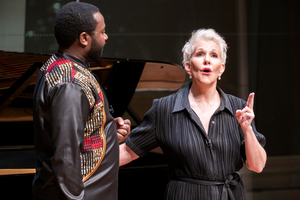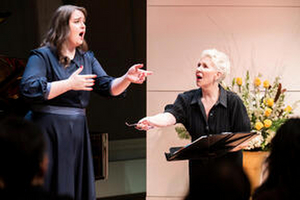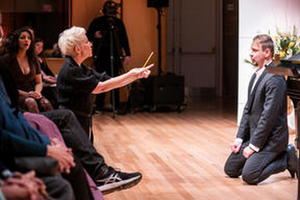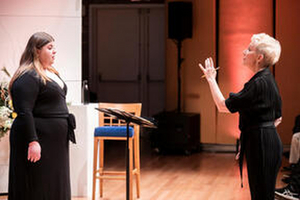Feature: What Does an Opera Star Do on Her Day Off? If You're Joyce DiDonato, It Means 'Paying It Forward'
The Mezzo’s Master Classes at Carnegie Hall pass along her wisdom to the next generation

Last week, when her hours were her own--and not at the Met as Virginia Woolf in THE HOURS by Kevin Puts and Greg Pierce--mezzo Joyce DiDonato (JDD) did what any hard-working opera star would choose to do: She spent three days with five young opera singers at Carnegie Hall's Weill Music Room in the Resnick Education Wing, showing them what's she's learned about becoming the best professional they can be and helping them move toward the careers they dream about.
I went to the second of the series of three Master Classes she held this year, all with the same singers, after she'd spent a day becoming somewhat familiar with what they could do. She does classes like these regularly and, as she's said before, she's no pedagogue but is "merely" (my quotes) there to pass along some of her life/professional experience to help these young singers have the artistic lives they want to have and, sometimes more importantly, the lives they should be thinking about from what she can hear in their voices and observe in their technique.

This wasn't the first time I've been to one of her master classes and I can tell you: This was no canned performance that she whips out of her bag of tricks. Each one of the singers--this time, two sopranos, one mezzo, a tenor and a baritone--received individual attention to specific issues that JDD pinpointed. As she put it, "They're all at different stages. Some things they do well, some they're still working on."
That last point--seeing her help improve something that still needs work--is quite amazing to watch and listen to. As she said near the beginning of the session, she talked about three subjects:
- How everything that gets done by the singer is about process--how to get from here to there
- How do singers go deeper in getting to the heart of the role, the aria, the opera
- How to deal with the priorities of this particular stage in a singer's career

Photo: Chris Lee
She talked about the characters who are being portrayed in the arias and what the singers should be looking for as they perform.
"You guys are so brave," she tells them, as they go out in the world of performing before demanding audiences. "You can't do it halfway: Life doesn't work that way," though she reminded the youthful performers that there are no guarantees that things will work out the way they want. But she also pointed out that they're not alone--that they have "a line into the energy of those who have done it before."
As you can imagine, the five places in these master classes are in great demand--which means that the level of singing that we get to hear is very high. (In fact, they made a place for an extra singer this year because of the level of singing.)

The afternoon began with American soprano Marissa Moultrie, who sang Elettra's raging aria, "D'Oreste, d'Aiace" from Mozart's IDOMENEO. She's already an active performer of opera, oratorio and lieder and has done many competitions, including the Met's Laffont Competition (formerly the National Council Auditions), where she's received her fourth encouragement award.
Then came Kenyan tenor Lawrence Barasa, who tackled another Mozart aria, "Se all'impero," for the title role in LA CLEMENZA DI TITO, which JDD likes best for its humanity, though the person who loves the emperor has also been betrayed by him. He has a vocal performance degree from the University of Oregon and is currently at the University of Maryland. He's performance director at the Kenyan Classical Singers' Organisation.
Next, there was Polish baritone Lukasz Zientarski, who took on Gounod's famed aria for Valentin in FAUST, "Avant de quitter ces lieux." JDD cautioned him that "if you give the audience everything, there's nothing for them to bring to it." "You have to trust the music and let it flow through you. Take your foot off the 'gas'--he knows he's brave; he doesn't need to show it." The baritone earned his Masters in music from the Paderewski Academy of Music in Poznan, Poland, before enrolling in the Academy of Vocal Arts in Philadelphia.
Indian-American soprano Anchal Indu Dhir, the youngest of the group, brought Verdi "Caro nome" from RIGOLETTO. JDD cautioned her about the need for discipline. "Go in to slow motion--train so that your voice will be able to do what it can for a long time." The singer's a senior at Ithaca College in upstate New York, majoring in vocal performance.
Finally, there was Estonian mezzo Rael Rent, who was in JDD "territory" with a Handel aria, "Ombra mai fu." JDD talked with her about leaning into the tension--the dance between the singer and the orchestra--but, as Callas said, "Read what's on the page" and study what the composer has written. She began her vocal training in Estonia's University of Tartu but did undergraduate work at the Royal Conservatoire of Scotland and is finishing her work at the Royal Welsh College of Music and Drama in the David Seligman Opera School.
It was a pleasure to see JDD at work with her charges, because she's as quick with praise as she is ready to show how to fix a problem when she hears one. The only disappointing aspect was that she knew exactly when she'd heard enough to go to work on specifics with the singer--which meant that she stopped performances mid-aria, just when we wanted to her more.
The session lasted about 2:30 hours, with able accompaniment from Ken Noda and Justina Lee. The classes are available on medici.tv and YouTube.
Comments
Videos

